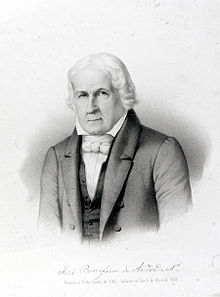José Bonifácio de Andrada e Silva
José Bonifácio de Andrada e Silva (also … Andrade… ; born June 13, 1763 in Santos , † April 6, 1838 in Niterói ) was a Brazilian mineralogist and statesman .
Life
Andrada e Silva studied law and natural sciences in Coimbra, Portugal . From 1790 he went on a ten-year educational and research trip through Europe on a royal scholarship. He trained as a mountain official under Abraham Gottlob Werner in Freiberg , made the acquaintance of Alexander von Humboldt , and attended lectures by Alessandro Volta in Pavia . On a trip to Sweden he discovered several minerals, which he described in 1800 as the first, including the Petalitos in which the Swedish chemist Johan August Arfwedson the element 1817 lithium should discover that he Wernerite mentioned scapolite and he Coccolit called diopside . Back at the University of Coimbra , he received the chair of geognosy created for him in 1801 and was appointed general manager of the Portuguese mining industry.
After fighting in the ranks of the Portuguese patriots at the time of the French invasion, he moved to Brazil in 1819. Here he headed the independence movement in São Paulo in 1821, became vice-president and on January 1, 1822, at the head of a deputation, handed over the address he had written, which asked Prince Pedro to remain in Brazil. On January 16, he took over as Minister of the Interior at the head of the administration, but got into battle with the Republican Party when the new constitution was being discussed, and as a result he and his colleagues submitted his resignation on October 25.
As early as October 30th, he was called back to the ministry following demands from the people. In 1823 he also got a seat and vote in the assembled estates and made it possible for the secret societies to be banned and strict measures to be taken against the republican partisans.
Forced by his opponents to resign again on July 17, 1823, he fought the new ministry in the chambers and protested against the violent dissolution of the General Assembly on November 12. He was therefore arrested with his brothers and embarked for Europe. While the former went to Bordeaux and lived there for the sciences until their later return, he again won the emperor's confidence, so that when he renounced the throne of Brazil on April 7, 1831 in favor of his son Dom Peter II , he appointed guardian of the latter. Released from guardianship in 1834 as a result of popular turmoil, Andrada e Silva withdrew into private life. He died on April 5, 1838 in Rio de Janeiro. He was a member of the Federation of Freemasons .
His younger brother Antonio Carlo was also a politician. The third brother, Martim Francisco de Andrada e Silva, was Minister of the Interior and died in Santos on February 23, 1844. The latter's two sons, José Bonifácio de Andrada e Silva and Martim Francisco de Andrada e Silva, made themselves known as poets, the former through Rosas e goivos (São Paulo, 1849), the latter through Lagrimas e sorrisos (Rio de Janeiro, 1847 ) and a drama: Januario Garcia (Rio de Janeiro, 1849).
Individual evidence
- ↑ N. Figurowski, The discovery of the chemical elements and the origin of their names, translated by v. Leo Korniljev / Ernst Lemke, Aulis-Verlag Deubner, Cologne 1981, ISBN 3-7614-0561-8 , p. 135
- ↑ http://www.musee.ensmp.fr/gm//mineralPETALITE.html ; http://www.mineralienatlas.de/lexikon/index.php/MineralData?mineral=Petalit
- ↑ According to the Portuguese Wikipedia, however, the Chair of Metallurgy - remains to be checked!
- ↑ Eugen Lennhoff, Oskar Posner, Dieter A. Binder: Internationales Freemaurer Lexikon . 5th edition 2006, Herbig Verlag, ISBN 978-3-7766-2478-6 , p. 75
Web links
| personal data | |
|---|---|
| SURNAME | Andrada e Silva, José Bonifácio de |
| ALTERNATIVE NAMES | Andrade e Silva, José Bonifácio de |
| BRIEF DESCRIPTION | Brazilian politician and statesman |
| DATE OF BIRTH | June 13, 1763 |
| PLACE OF BIRTH | Santos |
| DATE OF DEATH | April 6, 1838 |
| Place of death | Niterói |
